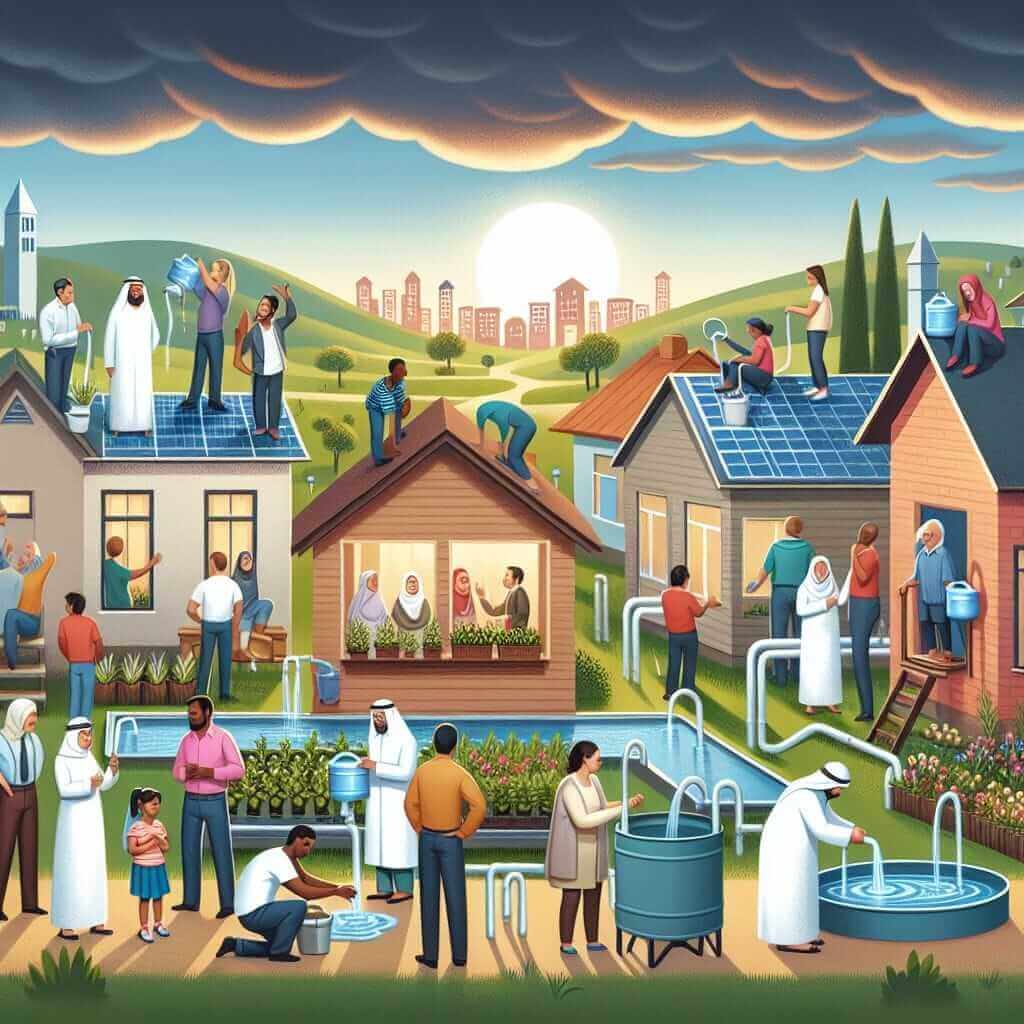Water conservation is crucial for sustaining life on Earth, and its role in combating climate change cannot be overstated. Increasingly, IELTS Writing Task 2 prompts emphasize environmental issues, with water conservation being a frequent topic. Understanding how to approach such prompts is vital for IELTS candidates aiming for band 7 or higher. This article will explore the significance of water conservation in mitigating climate change, providing a model essay along with a detailed analysis.
Here are some potential IELTS Writing Task 2 prompts related to water conservation and climate change:
- “To what extent do you agree or disagree that water conservation is the most effective way to combat climate change?”
- “Discuss the role of water conservation in mitigating the effects of climate change. Provide reasons for your answer and include any relevant examples from your own knowledge or experience.”
- “What are the main benefits and challenges of water conservation in the fight against climate change?”
Choosing a Prompt and Analyzing It
Let’s choose the second prompt:
“Discuss the role of water conservation in mitigating the effects of climate change. Provide reasons for your answer and include any relevant examples from your own knowledge or experience.”
Analysis of the Prompt
This prompt requires an in-depth discussion on how water conservation can mitigate climate change. The task is explanatory, asking for reasons and examples. The candidate needs to:
- Define water conservation.
- Explain how it influences climate change mitigation.
- Provide relevant examples.
- Write a balanced discussion.
Model Essay
Discuss the role of water conservation in mitigating the effects of climate change. Provide reasons for your answer and include any relevant examples from your own knowledge or experience.
In recent years, the imperative to address climate change has become increasingly urgent. An often underestimated but highly significant strategy in combating this global issue is water conservation. This essay will discuss the crucial role water conservation plays in mitigating the effects of climate change, highlighting the benefits and practical examples of its implementation.
Firstly, water conservation helps reduce the energy required to process and distribute water, thus lowering greenhouse gas emissions. For instance, the treatment of wastewater is energy-intensive, involving the use of various chemicals and machinery. By conserving water, we reduce the demand for wastewater treatment, subsequently decreasing the energy consumption and emissions associated with this process. Moreover, less energy is needed to pump, heat, and treat water when consumption is minimized.
Secondly, maintaining the health of ecosystems through water conservation can sequester carbon. Wetlands, forests, and other natural habitats rely on adequate water availability to function effectively. These ecosystems play a critical role in absorbing carbon dioxide from the atmosphere, thus acting as natural carbon sinks. For example, preserving wetlands in Australia has been shown to store significant amounts of carbon that would otherwise contribute to climate change if released into the atmosphere.
Additionally, water conservation contributes to the resilience of communities in the face of climate change. As climatic conditions become more unpredictable, conserving water ensures that communities have enough resources during periods of drought. This is particularly pertinent in regions such as Sub-Saharan Africa, where water scarcity poses a significant threat to food security and livelihoods. Efficient water management systems, such as rainwater harvesting and the use of greywater for irrigation, are practical measures that improve water availability and distribution.
Furthermore, water savings can reduce the frequency and severity of extreme weather events such as floods. Soil that is adequately hydrated through effective water management can better absorb heavy rainfall, reducing the likelihood of runoff and flooding. This was evidenced by the implementation of water conservation practices in the Netherlands, where improved land management was employed to mitigate flood risks.
In conclusion, water conservation is a multifaceted approach that significantly contributes to climate change mitigation. It reduces greenhouse gas emissions, enhances carbon sequestration, builds community resilience, and mitigates extreme weather events. As such, it is imperative that global and local policies prioritize water conservation in their climate action plans. Only through concerted efforts can we hope to manage our water resources sustainably and mitigate the far-reaching impacts of climate change.
Word Count: 389

Tips for Writing
When writing essays on topics like water conservation and climate change, consider the following:
- Use Clear Definitions: Clearly define terms like “water conservation” and “climate change mitigation” in your introduction.
- Provide Concrete Examples: Use real-world examples to support your arguments, such as specific case studies or statistics.
- Balanced Structure: Ensure your essay has a clear introduction, a well-structured body with multiple paragraphs, each addressing a specific point, and a concise conclusion.
Vocabulary to Remember
- Conservation /ˌkɑːn.sɚˈveɪ.ʃən/: (Noun) The act of preserving, guarding, or protecting; wise use.
- Mitigate /ˈmɪt.ɪ.ɡeɪt/: (Verb) To make less severe or serious.
- Energy-intensive /ˈen.ər.dʒi ɪnˈtensɪv/: (Adjective) Requiring a large amount of energy.
- Sequester /sɪˈkwes.tər/: (Verb) To isolate or hide away; to capture (carbon dioxide) from the atmosphere.
- Resilience /rɪˈzɪl.jəns/: (Noun) The ability to recover quickly from difficulties; toughness.
- Ecosystem /ˈiː.koʊˌsɪstəm/: (Noun) A biological community of interacting organisms and their physical environment.
- Sustainable /səˈsteɪ.nə.bəl/: (Adjective) Capable of being maintained at a steady level without exhausting natural resources or causing severe environmental damage.
- Runoff /ˈrʌn.ɒf/: (Noun) The draining away of water (or substances carried in it) from the surface of an area of land, a building, or a structure.
- Carbon Sink /ˈkɑː.bən sɪŋk/: (Noun) Natural systems that absorb more carbon dioxide than they release.
- Treat /triːt/: (Verb) To manage or process a substance to make it suitable for a particular purpose.
Conclusion
Water conservation plays a pivotal role in climate change mitigation, offering numerous environmental, economic, and social benefits. Essays on this topic not only allow IELTS candidates to demonstrate their knowledge but also their ability to structure arguments logically and coherently. To further practice, students can explore related prompts and use the tips provided to ensure they’re well-prepared for their IELTS Writing Task 2.